lesson2
新概念二Lesson 2
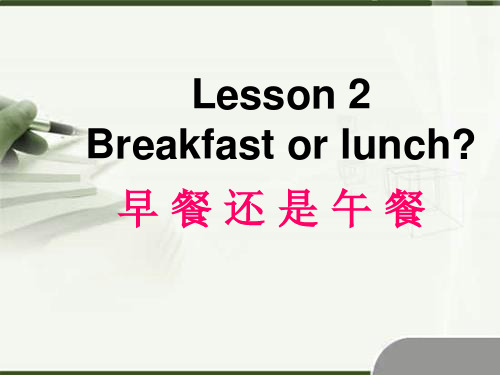
Exercises
A Write out these two paragraphs again. Give the right form of the words in parentheses.
1. I am looking out of my window. I can see some children in the street. The children ___________ are playing (play) football. They always play (play) football in the street. Now a _____ is kicking (kick) the ball. little boy _________ Another boy __________ is running (run) after him but he cannot catch him.
2)how 结构 (以形容词,副词为主) ① how + adj./adv. + 主 + 谓! ② how + adj. + a/(an) + cn.(单)+ 主 + 谓! ③ how + 主 + 谓!(实义动词作谓语)
他是一个多么可爱的男孩啊!
What a lovely boy he is! How lovely a boy he is! How lovely the boy is!
B Write these sentences again. Put the words in parenctheses in the right place. 1. She answers my letters. (rarely) She rarely answers my lettters. 2. We work after six o'clock. (never) We never work after six o'clock.
《Lesson 2》 教学设计
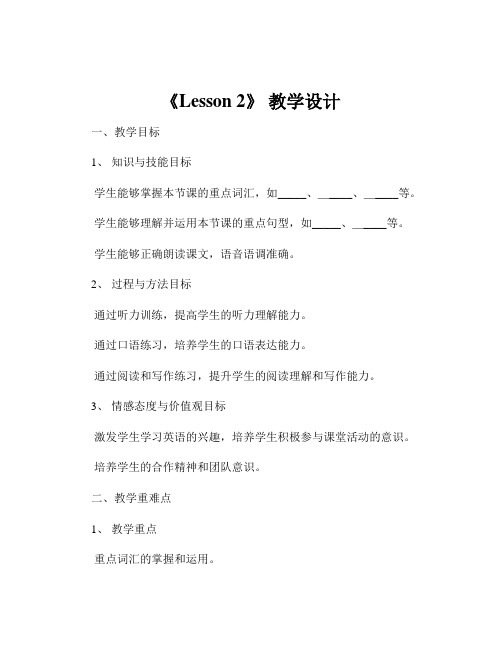
《Lesson 2》教学设计一、教学目标1、知识与技能目标学生能够掌握本节课的重点词汇,如_____、_____、_____等。
学生能够理解并运用本节课的重点句型,如_____、_____等。
学生能够正确朗读课文,语音语调准确。
2、过程与方法目标通过听力训练,提高学生的听力理解能力。
通过口语练习,培养学生的口语表达能力。
通过阅读和写作练习,提升学生的阅读理解和写作能力。
3、情感态度与价值观目标激发学生学习英语的兴趣,培养学生积极参与课堂活动的意识。
培养学生的合作精神和团队意识。
二、教学重难点1、教学重点重点词汇的掌握和运用。
重点句型的理解和运用。
2、教学难点如何让学生在实际情境中灵活运用所学知识。
如何培养学生的英语思维能力。
三、教学方法1、情景教学法通过创设生动有趣的情景,让学生在实际情境中学习和运用英语。
2、任务驱动法布置各种任务,让学生在完成任务的过程中提高英语能力。
3、合作学习法组织学生进行小组合作学习,培养学生的合作精神和团队意识。
四、教学过程1、导入(5 分钟)通过播放一段与本节课主题相关的英语视频或歌曲,引起学生的兴趣,导入新课。
提问学生关于视频或歌曲的内容,引导学生思考并回答问题。
2、词汇学习(10 分钟)展示本节课的重点词汇,通过图片、实物、动作等方式帮助学生理解词汇的含义。
带领学生朗读词汇,纠正发音。
组织学生进行词汇游戏,如单词接龙、猜单词等,巩固所学词汇。
3、句型学习(10 分钟)呈现本节课的重点句型,讲解句型的结构和用法。
给出例句,让学生模仿例句进行造句练习。
邀请学生展示自己的造句,进行点评和纠正。
4、听力训练(10 分钟)播放课文录音,让学生边听边理解课文内容。
提出问题,检查学生的听力理解情况。
再次播放录音,让学生跟读,模仿语音语调。
5、阅读训练(10 分钟)让学生自主阅读课文,理解课文大意。
组织学生进行小组讨论,回答与课文相关的问题。
邀请小组代表汇报讨论结果,进行总结和评价。
新概念英语第2册课程讲义Lesson2

Lesson2单词讲解1.until prep.直到until nowuntil lunchtime2.outside adv.外面insideupside down3.ring v.(铃,电话等)响ring rang rungsing sang sungdrink drank drunkswim swam swumbegin began begunring n.4.repeat v.重复re-retellrewriterediscoverRebroadcastLesson2课文&语法讲解一般现在时现在进行时感叹句一般现在时现在进行时时态?如何体现?一共多少种?一般现在时谓语v.=原形/第三人称单数(do/does)I tell you a secret.He tells you a secret.Your friend tells you a secret.一般现在时谓语v.=原形/第三人称单数(do/does)用法1:表示现在经常性习惯性的动作We have the English class every day.He often gets up late.always,usually,often,sometimes,never…一般现在时谓语v.=原形/第三人称单数(do/does)用法2:表示现在的状态I am a teacher.We are happy together.一般现在时谓语v.=原形/第三人称单数(do/does)用法3:表示永恒The earth is round.The earth moves around the sun.Practice makes perfect.一般现在时变否定/疑问现在进行时谓语v.=am/is/are+doing用法1:表示现在正在进行的事We are studying English now.J.K.Rowling is writing another book this year.现在进行时谓语v.=am/is/are+doing用法2:表示将来确定要发生的事I am coming to see you.We are arriving at....The old man is dying.现在进行时变否定/疑问He is listening.He is not listening.Is he listening?What is he doing?1.It was Sunday.2.I never get up early on Sundays.3.I sometimes stay in bed until lunchtime.4.I looked out of the window.5.It was dark outside.6.'What a day!'I thought.感叹句:What+n./n.词组!How+adj./adv.! What a wonderful world!How interesting!7.'It's raining again.’8.Just then,the telephone rang.9.It was my aunt Lucy.10.'I've just arrived by train,'she said.11.'I'm coming to see you.’12.'But I'm still having breakfast,'I said.13.'What are you doing?'she asked.14.'I'm having breakfast,'I repeated.15.'Dear me,'she said.16.'Do you always get up so late?17.It's one o'clock!'Lesson2知识拓展本课重点:一般现在时do/does 现在进行时am/is/are+doing一般现在时/现在进行时Right now I’m in class.I(sit)_______________at my desk.I usually(sit)_______________at the same desk in class every day.一般现在时/现在进行时Right now I’m in class.I am sitting at my desk.I usually sit at the same desk in class every day.一般现在时/现在进行时Ali(speak)_______________Arabic.Arabic is his native language,but right now he(speak)_______________English.一般现在时/现在进行时Ali speaks Arabic.Arabic is his native language,but right now he is speaking English.一般现在时/现在进行时A:(it,rain)_______________a lot in southern California?B:No.The weather(be)_______________usually warm and sunny.一般现在时/现在进行时A:Does it rain a lot in southern California?B:No.The weather is usually warm and sunny.一般现在时/现在进行时A:I’ll take those-the yellow flowers.B:Here you are,mister.Are they for a special occasion?A:I(buy)_______________them for my wife.I(buy)_______________her flowers on the first day of every month.一般现在时/现在进行时A:I’ll take those-the yellow flowers.B:Here you are,mister.Are they for a special occasion?A:I am buying them for my wife.I buy her flowers on the first day of every month.本课重点:一般现在时do/does 现在进行时am/is/are+doing。
新概念英语第三册:Lesson2重点句型解析

【导语】新概念英语作为家喻户晓的经典之作,它有着全新的教学理念,有趣的课⽂内容及其全⾯的技能训练,为⼴⼤的英语学习者提供帮助!如果你也想学好英语,⼜怎能错过新概念英语?下⾯为您提供了相关内容,希望对您有所帮助! 1、Was the vicar pleased that the clock was striking? Why? Our vicar is always raising money for one cause or another, but he has never managed to get enough money to have the church clock repaired. 现在进⾏时和 always 等频度副词搭配时:表⽰说话⼈带有某种的情感⾊彩 Tom is always doing homework. 汤姆总是做家庭作业,怎么也做不完。
Tom always does his homework. 汤姆总是做家庭作业,不拖⽋作业。
He is always making noises. 他总是吵吵闹闹,真烦⼈。
one or another:表⽰这样或那样 -- for one reason or another 处于这样或那样的原因 -- at one time or another 在这样或那样的时间 -- in one way or another ⽤这样或那样的⽅法 get enough money to do sth 募集⾜够的资⾦做某事 -- I have to get enough money to have my house repaired. have something done 1>找某⼈来做某事 -- have the church clock repaired -- have the plane repaired / -- have hair cut 2>某⼈所遭受到的意外某种情况(主语必须是发出动作的⼈) -- His wallet was stolen. → He had his wallet stolen. 2、The big clock which used to strike the hours day and night was damaged many years ago and has been silent ever since. used to:过去常常做,⽽现在不再发⽣的事情了 -- He used to smoke every day. 3、One night, however, our vicar woke up with a start: the clock was striking the hours! However -- 在⼝语中, 主要⽤于句⾸;在作⽂中, 好⽤在句中、句尾。
新概念英语NCE2_Lesson02课件

Notes on the text
• What a day? • What + a + n.——感叹句 • It is a terrible day.==> What a
terrible day! 省略 : 1.主、谓随时可省 what a good girl (she is)! what a good girl (she is)! 2.省形容词 What a day!
发生) • Often , Always——一般现在时 • “现阶段”:I am working as a teacher. • 频率副词往往放在句子中间, 实义动词前, 非实义动词后 • 如果既有实义动词又有非实义动词, 要放在两个之间. • 疑问句中副词往往放在主语后面. • 非实义动词 : • 1.系动词(be) 2.助动词帮助动词构成时态的(do, does, will, shall, have,
• It was Sunday. I never get up early on Sundays. I sometimes stay in bed until lunchtime. Last Sunday I got up very late. I looked out of the window. It was dark outside. 'What a day!' I thought. 'It's raining again.' Just then, the telephone rang. It was my aunt Lucy. 'I've just arrived by train,' she said. 'I'm coming to see you.'
Lesson 2
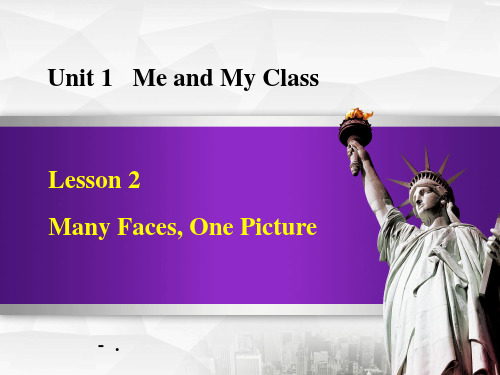
with
on
to
Listen and circle the correct answers.1.Wang Mei was wearing (traditional/sports) clothes in her picture.2.Wang Mei was (singing/dancing) in the picture.3.Li Ming prepared (two/three) pictures for the class picture.4.Li Ming chose a picture. In that picture,he was (planting a tree/riding a camel).
Unit 1
Many Faces, One Picture
Lesson 2
Me and My Class
- .
同学们,上一课学习的单词你们都掌握了吗?现在大家来检验一下,点击下面的音频开始听写吧!
Can you describe the people in this picture in English in the aspects of age, class and clothes?
讲解来自《点拨》
知识点
新概念英语第四册课文Lesson2

★⽆忧考新概念英语频道为⼤家整理的新概念英语第四册课⽂Lesson2,供⼤家参考。
更多阅读请查看本站频道。
Lesson 2 Spare that spider不要伤害蜘蛛First listen and then answer the following question.听录⾳,然后回答以下问题。
How much of each year do spiders spend killing insects?Why, you may wonder, should spiders be our friends? Because they destroy so many insects, and insects include some of the greatest enemies of the human race. Insects would make it impossible for us to live in the world; they would devour all our crops and kill our flocks and herds, if it were not for the protection we get from insect-eating animals. We owe a lot to the birds and beasts who eat insects but all of them put together kill only a fraction of the number destroyed by spiders. Moreover, unlike some of the other insect eaters, spiders never do the least harm to us or our belongings.Spiders are not insects, as many people think, nor even nearly related to them. One can tell the difference almost at a glance, for a spider always has eight legs and an insect never more than six.How many spiders are engaged in this work on our behalf? One authority on spiders made a census of the spiders in a grass field in the south of England, and he estimated that there were more than 2,250,000 in one acre; that is something like 6 million spiders of different kinds on a football pitch. Spiders are busy for at least half the year in killing insects. It is impossible to make more than the wildest guess at how many they kill, but they are hungry creatures, not content with only three meals a day. It has been estimated that the weight of all the insects destroyed by spiders in Britain in one year would be greater than the total weight of all the human beings in the country.New words and expressionsBeast n. 野兽Census n. 统计数字Acre n. 英亩Content adj. 满⾜的本⽂参考译⽂你可能会觉得奇怪,蜘蛛怎么会是我们的朋友呢?因为它们能消灭那么多的昆⾍,其中包括⼀些⼈类的⼤敌,要不是⼈类受⼀些⾷⾍动物的保护,昆⾍就会使我们⽆法在地球上⽣活下去,昆⾍会吞⾷我们的全部庄稼,杀死我们的成群的⽜⽺。
lesson2

找出 [ h ]、 [ r ] hole heart harm white who wheat
road rain parrot wrap mirror
[f] [v] [s] [z]
f、ff、ph、gh
v
s、c s、z
ss、ce se
[h]
[r]
h、wh
r、rr、wr
今天我们学到了什么?
[ i ] [ i: ]
[z]
字母s、z zero zoo bags nose rose
字母组se
找出 [ s ]、 [ z ]
busy case size as
whose those bus shoes glass
[h]
h、wh发音 hair her he head who whose
[r]
r、rr、wr发音 rice room ride rose carrot write wrong
[e]
e放词首、词中发音 bet red let egg ea发音 bread head ready breakfast
找出[e]
elephant desll sweater
[]
一般只有 a 发 []
找出 []
map black apple hand rat stand
[p]
p发音:
pp发音 pet stop pen pig happy apple
[b]
b发音 bb发音 bird book big bag rabbit cabbage
找出 [ p] 、[ b]
banana ball boy bus baby
panda piano ship pear
[ t ] t发音
新概念英语第三册-Lesson2

• 10.“We'll get used to that Bill,” said the vicar. “13 is not as good as one but it's better than nothing. Now let's go downstairs and have a cup of tea.”
3.One night, however, our vicar woke up with a start: the clock was striking the hours!
• ★However • 在口语中, 主要用于句首;在作文中, 最好 用在句中、句尾。要用逗号分隔开来。
• • • •
★Start n.vt.惊跳, 惊起 -- The noise made him started(v.). -- What a start you gave me. -- he stood up with a start(n.).
★raise
• • • • • •
[reɪz]
v. 募集,筹款
4) v. 种植 raise wheat 种植小麦 5) v. 招募 raise an army 招募一支军队 6) v.提出,发出 raise a cheer 发出欢呼声
★torchlight [’tɔ:tʃlaɪt]n. 电筒光 • torch n.手电筒
Note on the text 课文详解
1.Our vicar is always raising money for one cause or another, but he has never managed to get enough money to have the church clock repaired. • ★ 现在进行时和 always等频度副 词搭配时:表示说 话人带有某种的情 感色彩。
新概念二册Lesson 2 课文

§ Lesson— 2 Breakfast or lunch?早餐还是午餐?【课文讲解】1、It “虚主语”。
①、It’s already nine o’clock. 已是9点了。
【指时间】②、It is about 5 kilometers from the company to my home.从公司到我家大概有5公里。
【指距离】③、It was very quiet in the garden. 花园里很安静。
【指环境】④、It’s very cold today. 今天很冷。
【指天气等自然现象】It is raining. 正在下雨。
It’s 37℃today. 今天气温是37度。
⑤、--- How’s it going? “情况如何?”【笼统地谈论某情况】--- Well, not so good. “不是很好。
”⑥、It is a lovely baby. 这是个可爱的小婴儿。
【指人】It was my aunt Lucy. 是我姑妈Lucy打来的。
2、never adv. 从不;永不;决不;I will never forget your kindness. 我永远忘不了你的好意。
We never flinch from difficulties. 在困难面前我们决不退缩。
She never goes to the cinema. 她从来不看电影。
Never in my dreams did I think I would meet her again.我做梦都没想到会再见她。
★never可用于句首以加强语气,其后的句子要主谓倒装。
3、on Sunday s每逢星期天【on】后面所接的时间多与日期有关。
1.表示在具体的某一天(如日期、生日、节日或星期几)。
如:on May 4th,1919;on my birthday;on Teachers’ Day;on Monday 等。
新概念英语第三册Lesson-2
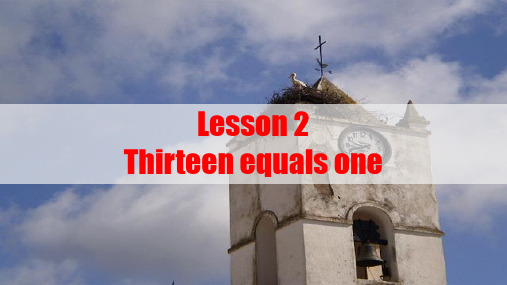
equal
adj.相等的
※ be equal to ...
※ equality ※ sexual equality/racial equality
raise
v.举起
raise your hand raise your voice raise your glass (to sb) raise a flag raise the roof raise one’s eyebrows (at/over...)
-- No one equals him in singing. matches
equal
n.同等的人;相等物;匹敌者
※ without equal/ have no equal 无敌;无与伦比
-- She has no equal in English in her class. -- She is a ski player without equal.
v Christianity v Buddhism v Islam
part 2 New words and expressions
equal raise vicar torchlight
v.等于 v.筹集;筹(款) n.牧师 n.电筒光
equal raise vicar torchlight
He is constantly going to the gym these days. When I am travelling, I normally use my laptop. I will instant message with a friend.
Our vicar is always raising money for one cause or another, but he has never managed to get enough money to have the church clock repaired.
新概念二Lesson 2 知识点整理

look out= watch out = be careful小心
例:Look out!The car is coming!
look through浏览
look into调查
look at看= have a look看一看
3.Just then, the telephonerang.Itwas my aunt Lucy.
就在这时,电话响了,是我的姑姑露西。
(a)just then就在那时
近义短语:at that moment
(b)ring (过去式rang)v.
1)(铃、电话等)响(刺耳的)
注:这种响是刺耳的,往往提醒某人做某事。
例:The door bell is ringing.门铃正在响。
2)给某人打电话ring sb.
3.Isometimes stay in bed until lunchtime.
was dark outside.
5.Ihave just arrived by train.
6.What are you doing?
7.Dear me!
8.Do you always get up so late?
重点语法
重点语法
1.until的用法
prep.直到
直到...才;直到...为止not…until
后面加(时间状语)从句,前面就是主句, until在肯定句中与表示持续性状态的动词连用,在否定句中与描述短暂动作的动词连用。
1) His father didn't die until he came back. (肯定)
例:TomorrowI’ll ring you.
新概念英语第一册Lesson2课件
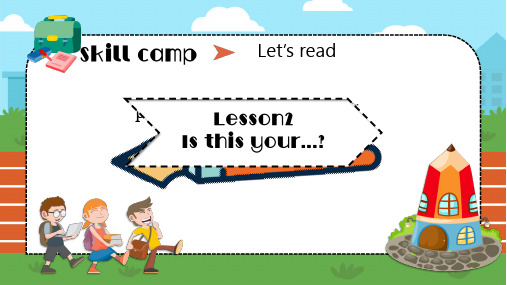
含有be动词的一般疑问句的构成:
但如果句子主语是第一人称,变成一般疑问句时 要将主语换成第二人称。如:
I’m a student.
Are you a student?
一般疑问句的回答:
一般疑问句的肯定回答一般为 “Yes,...”, 而否定 回答为 “No,...”。如:
Is this your house? 这是你的房子吗?
一般疑问句的概念: 能用yes/no(或相当于yes/no)回答的问句叫一般 疑问句。
含有be动词的一般疑问句的构成:
当陈述句中有be动词(am, is, are)时,可直接将 be动词提至主语前。如:
He is a worker.
She is eleven years old.
Is he a worker? Is she eleven years old?
Let’s write
提示词:excuse, yes, shoe, pardon, thank
Is thEixscuyoseurmseh!oe?
Thank PYyeaoYsrued.istov?iensr?.y much.
英语中be动词有am, is, are三种形式,它们分别和不同的人 称代词连用,我们先来学一学is的用法。请看下表:
Amazing world
Hi, guys!你们听过“包治百病” 这个词语吗?它的本意是“一 切疾病都可以治疗。”,不过 现在网络的流行说法是“包包 可以缓解女性不开心的情绪。” 可见,女士们对handbag的钟 爱啦!下面,请跟我一起看看 世界顶级品牌之一的迪奥包包 的制作过程吧!
This
your
pen.
It
is
your
watch.
新概念英语 第二册 Lesson 2

共读一本书《新概念英语》lesson 2Lesson 2 Breakfast or Lunch?一阅读课文课文内容:Why was the writer’s aunt surprise d?It was Sunday. I never get up early on Sundays. I sometime s stay in bed until lunchtime. Last Sunday, I got up very late.I looked out of the window. It was dark outsi de. ‘What a day!’ I though t. ‘It’s raining again.’ Just then, the telephone rang. It was my aunt Lucy. ‘I've just arri ved by train,’she said. ‘I'm coming to see you.’‘But I'm still havi ng breakfast,’ I said.‘What are you doing?’ She asked.‘I'm having breakfast,’ I repeated.‘Dear me,’ She said. "Do you always g et up so late? It's one o'clock!’1 ring v. (rang,rung)(1)(铃、电话等)响The telephone / door bell is ringing.电话铃/门铃响了。
(2)给……打电话He ran g me at m y mother's.他打电话到我妈妈家找我。
2 repeat v.重复;重说You have to repe at the cl ass.你必须重修这门课。
新概念二册lesson 2

Lesson 2 Breakfast or lunch 早餐还是午餐一词汇拓展brunch n 早午餐nephew n 侄子,外甥niece n 侄女,外甥女cause v 引起,使遭受not.......until 直到.......才Eg; I didn’t get up until 10 o’clock.二短语ring sb=call sb=give sb a ring 给某人打电话be surprised at sth 对某事惊讶be surprised to do 对做某事惊讶never=助动词+not 从来不arrive at+小地点arrive in +大地点get up early 早起stay up late 熬夜stay in bed 呆在床上look out of 向外看Just then=at that moment 就在那时by train乘火车by sea 乘船by air 乘飞机by taxi乘出租车表示交通方式的时候用by 直接加交通工具,不加冠词强调动作本身用take加冠词,在加工具本身。
take a train take a bus/take a cartake a plane take a shipsometimes(有时) some times(几次几倍)sometime(在某个时刻)some time (一段时间)三语法it指时间、天气、温度或距离,也可以指一件东西、一件事件或用来指是什么人,被称为虚拟主语。
always 总是> often=usually 经常> sometimes 有时候> seldom 偶尔> hardly几乎不> never从不(频率副词用在be后实前)感叹句通常有what, how引导,表示赞美、惊叹、喜悦、等感情。
What + (a / an) + 形容词+ 名词+ (主语+ 谓语)What + 形容词+ 可数名词复数+ 其他What + 形容词+ 不可数名词+ 其他How + 形容词+主+谓+···!How + 形容词+a / an+ 名词+主+谓+···!进行时态be coming ,表示将来,表示近期按计划或安排要进行的动作。
新概念英语第一册lesson (2)ppt课件

Practice :policeman game Production: role player
23
Sorry, sir.
My coat and my umbrella please. Here is my ticket. Thank you sir. Number five. Here is your umbrella and your coat. This is not my umbrella. Sorry sir. Is this your umbrella? No, it isn't. Is this it? Yes, it is. Thank you very much.
1
生命的价值
在一次讨论会上,一位著名的演说家没讲一句开场白,手里却高举着一张20 美元的钞票。面对会议室里的200个人,他问:谁要这20美元 一只只手举了起 来。他接着说: 我打算把这20美元送给你们中的一位,但在这之前,请准许我 做一件事。 他说着将钞票揉成一团,然后问: 谁还要?还是有人举起手来.他又 说:那么,假如我这样做又会怎么样呢? 他把钞票扔到地上,又踏上一只脚,并 且用脚碾它。尔后他拾起钞票,钞票已变得又脏又皱。 现在谁还要? 还是有人 举起手来。 朋友们,你们已经上了一堂很有意义的课。无论我如何对待那张钞票,你们还是 想要它,因为它并没贬值,它依旧值20美元。人生路上,我们会无数次被自己的 决定或碰到的逆境击倒、欺凌甚至碾得粉身碎骨。我们觉得自己似乎一文不值。 但无论发生什么,或将要发生什么,在上帝的眼中,你们永远不会丧失价值。 在他看来,肮脏或洁净,衣着齐整或不齐整, 你们依然是无价之宝。
• book n.书
• your 你的,你们的
• watch n.手表
- 1、下载文档前请自行甄别文档内容的完整性,平台不提供额外的编辑、内容补充、找答案等附加服务。
- 2、"仅部分预览"的文档,不可在线预览部分如存在完整性等问题,可反馈申请退款(可完整预览的文档不适用该条件!)。
- 3、如文档侵犯您的权益,请联系客服反馈,我们会尽快为您处理(人工客服工作时间:9:00-18:30)。
13.put up
知识导航
1.You arewearing traditional clothes.
辨析Wear ,put on, in与dress
Wear强调“穿;戴”的状态,其宾语可以是衣服、鞋帽,也可以是首饰、眼镜、头发等。
A put up B put on C put down D put off
主备人
狄晓霞
审核人
授课人
学习目标(任务)
掌握单词,句型,短语
学习重点难点
学会运用句型
学生自主学习方案
导学方案
学ቤተ መጻሕፍቲ ባይዱ流程
①读书自学
英汉互译
1.表演____________ 2.劝告________________
3.同意____________ 4.胶水_______________
5.建议某人做某事_______________________________
6.由……定____________ 7.同意……______________
8. look like ___________ 9. traditional clothes_________
10.Spring Festival _____________ 11. erhu ____________
---- Yes. It’s a good habit.
A. put off B. put on C. put up D. put down
6. I don’t know how to do it ; it’s _______ him.
A. up down B. up to C. up on D. up with
agree on表示就…取得一致意见agree on doing something表示同意干某事agree to do sth表示同意干某事
②合作探究
③问学释疑
⑤拓展延伸
反思
4. I like playing _____ piano, but my brother likes playing ______ basketball.
A. the ; the B. a ; the C. / ; the
D. the ; /
5. ---- Never _____ today’s work till tomorrow.
观音堂中学(八)年级(英语)科导学案
姓名:
课题
Lesson2: Many Faces , One Picture
节次
2
学习流程
④过关检测
My brother ________ lend me his bike yesterday.
He ______ helping us with the work.
7. --- Miss Liu , I left my homework at home.
--- You can ____ it here this afternoon.
A. bring B. take C. carry
拓展
Could you help methe map on the wall?
No problem
In表示“穿着;戴着“后接表示衣服或颜色的词The boys ____ blue is my brother.
dress表动作时,后接人作宾语;表状态时,可用“be dressed in+服装”The boys in summer are all _______ in shorts.
2. agree with表示同意某人的观点或所说的话
A. not to do B. not do C. to do D. do
3. ---- Young kids shouldn’t go swimming alone .
---- I agree ______ you. It’s too dangerous .
A. with B. on C. to D. in
I don’t _______ what you said.
课堂检测
1.Most British high school children ______ uniforms at school.
A. Wear B. dress C. put on D . dress up
2. I strongly advised you _____ so.
Shelong hair.她留着长发
Shea green dress now.她现在穿着一条绿色的连衣裙。
Put on侧重“穿;戴”的动作,
Please ________ your coat.
I ______ my hat and went out .
She ______ the child quickly.
